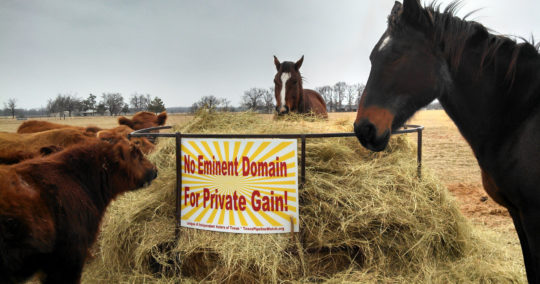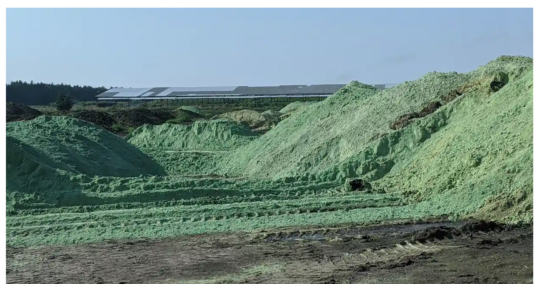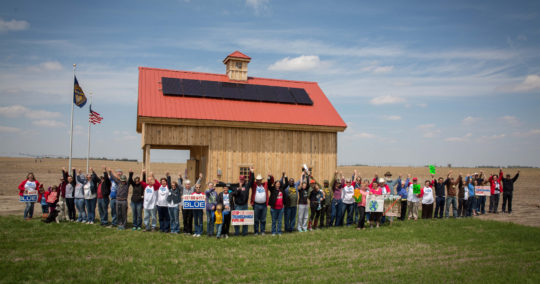

Thanks to all of the citizens who stood up and took action last year when an out-of-state company applied to build a fracking wastewater injection well in western Nebraska, legislation was introduced in the Legislature this session that would add some long-overdue upgrades to protections for our land and water, and reassess the role of the Nebraska Oil & Gas Conservation Commission (NOGCC).
A public hearing on LB 1082 and LB 1070 was held on Wednesday, Feb. 17. Sen. Ken Haar’s LB 1070 — which would have required liability insurance ($1 million+) and added groundwater protections on injection wells, was not advanced, but Sen. Stinner’s LB 1082 was advanced, and will be heard for full floor debate soon.
It’s crucial that we maintain our momentum and make our voices heard so the Legislature follows through with the critical reforms offered with LB 1082.
WATCH: Bold Nebraska’s Jane Kleeb testifies in support of LB 1082 at the hearing.


LB 1082: SUPPORT
LB 1082 would change powers and duties of the NOGCC, removing the “promotion” of the oil & gas business in the state out of the regulatory agency’s purview. 1082 provides for a periodic injection well fluid analysis and report, and provide bond notification requirements to harmonize provisions. More public notifications and hearings about wastewater projects would be required, as well as additional well monitoring that is not being done now.
ACTIONS:
- Urge Senators to support LB 1082, to put stronger regulations in place on the Nebraska Oil & Gas Commission to protect our land and water from fracking wastewater, and to eliminate the NOGCC’s current role of both “promoting” and regulating the oil & gas industry in the state.
- Scroll down for Testimony Tips
- ACTION: Call and e-mail your state senator, and urge them to support LB 1082 to institute reforms at the NOGCC.
TIPS FOR YOUR TESTIMONY & CONTACTING YOUR SENATOR:
- A recent poll found that 77% of Nebraskans are opposed to fracking waste, and 88% believe we should have the proper laws in place.
- Transparency + “public” hearings: The Legislature ignored pleas from Bold Nebraska and Nebraska Sierra Club to hold a hearing in Scottsbluff, in order to give the landowners and others most impacted by the proposed fracking waste disposal well an opportunity to testify. Instead they scheduled on it on a Tuesday morning at 9:00 a.m. in the town of Sidney — a 90-minute drive for landowners affected by fracking waste, and 5+ hours for those in Lincoln or Omaha. The issue of transparency and accessibility for public hearings on fracking is one that should be raised during the hearing. This continues the effort by Government agencies to stifle the voices of the public, the same way the NOGCC first told us we couldn’t testify during their fracking well hearing process — and then completelyignored all public testimony when voting on their decision.
- On deaf ears: Oil & Gas Commission fails to respond: State Senators, public health officials, landowners, environmental groups, citizen advocacy groups and the Oglala Sioux Nation were all united in their clear statements on fracking waste. Every single one of these groups of people all asked for the Oil & Gas Commission to reject the permit — or at the very least, put it on hold until proper scientific studies can be completed and proper laws put in place. The NOGCC ignored these voices and approved it anyway.
- Conflict of interest: Oil & Gas Commission “promotes” AND “regulates”?: The Oil and Gas Commission — an unelected body appointed by Gov. Ricketts — has a mission to both “promote” and “regulate” oil and gas (including fracking waste). You simply cannot regulate on the one hand, and promote on the other without having a clear conflict of interest.
- How do Nebraska’s fracking laws stack up?
- Nebraska has no laws in place to protect our land, water and public health from fracking waste.
- Colorado’s regulations on oil and gas run 300-400 pages, while Nebraska has just 50 pages, with only a few sentences about protecting our land and water.Colorado requires a $1 million bond to cover accidents, while Nebraska requires only $10,000 — less than the insurance on your car.
- In Kansas, new maximum daily limits were placed on disposal of fracking wastewater because of concerns it was causing earthquakes on previously unknown fault lines.



